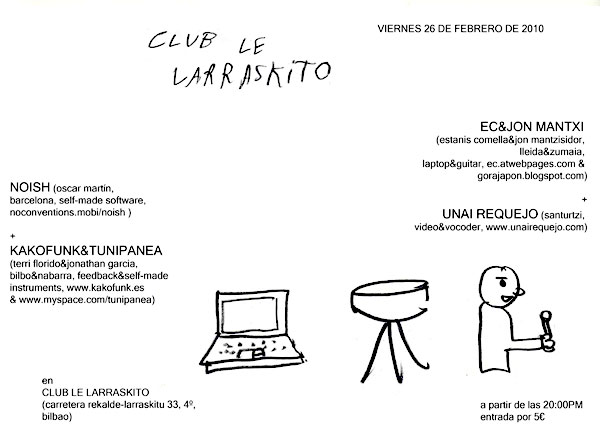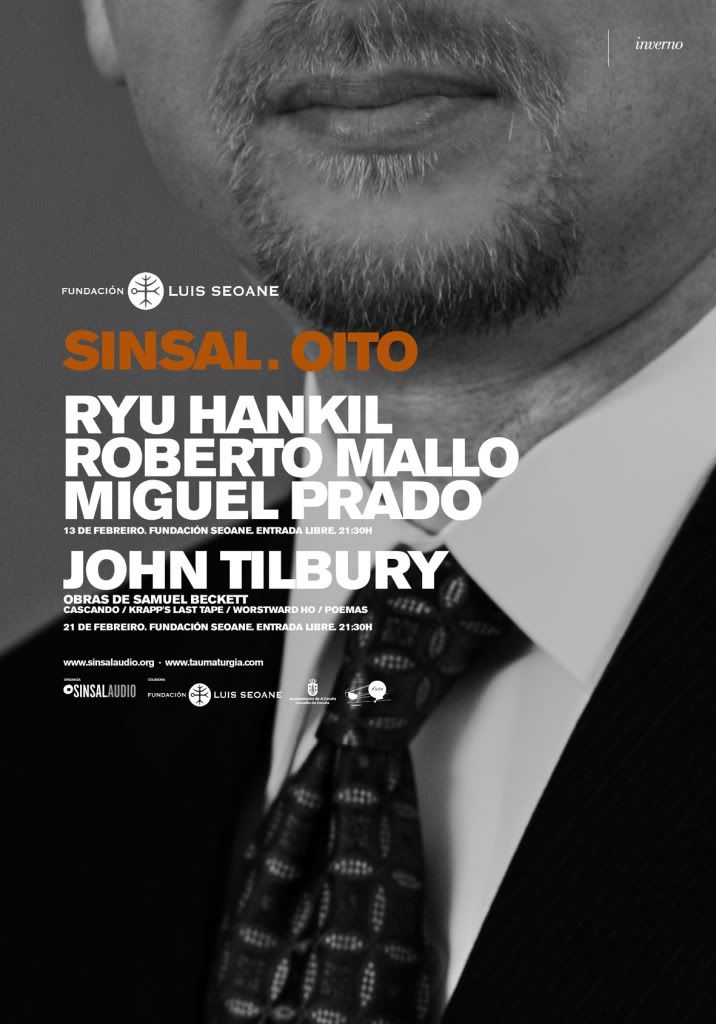Aquí os dejo algunas impresiones sobre el concierto de Mattin con Keith Rowe en A Coruña, animo a que si alguien quiera aportar algo lo haga.
(concerto-performance out 2009)
by Olalla Senorans
***
I’m late. Bewilderment. Bewildered./ Rhythm. Climate. Subtlety. Craftmanship. Cadence./ Massage. Medium. Distance./ Silence./ Observation. Unfocused. Environment. Audio./ Placing. Dis-placing./ Concert. Dis-concert-ed./ (Dis) contextualized silences. Related search. Patience. Wait./ Sensual opening./ Bells. Territory./ Noise. Factory./ Quietness./ Damage. Violence./ Stampede. Noise. Aggressiveness./ Calm presence. Crafty manipulation./ Cadenced isolation. Light gestures./ (Dis) mantling without a sign./ Leaving the trade of the non – trace; its absence. Space for the other(s)./ For sharing the harvesting.
Mirror.
For a few. Of chants. Multiple reflections. Echo./ Out with the air./ Return./ Absorbing. Assimilating. Bodily process. Saturation./ Sensual, mental relief. Physical non – relief./ Drowsiness.
Absence of the harvester / of the manufacturer. Of the mirror which transforms the silent and noisy reflections of ourselves./ Presence of the still spectator. Unreal./ Distressing./ Comic. Fictitious. Real./ Distressed world. Parasitic society. Paralysed/
Laughter, rescuing me from the illogical / the absurd social reality. Humour is a fluid that closes the gaps between the insurmountable.

Clinames
by Claudio Pato
* You asked whether it is a patience or an attention issue. Whether the Englishman is a mentally dis- ordered person? A revenant, someone who continuously arrives and returns. Or, rather, it could be me the one who suffers a mental dis-order consequently with attending, stoned, to “such a speech” over the kitchen table. * Is the one returning a different one, one arriving from far away? A different one, caring about grazing, about touch, about violence. * The mentally dis- ordered tries to think of an action that might return an im-possible which should endeavour (to thrive) in this world. Thus, the mentally dis-ordered are a crowd. A crowd of hair and boulders and stereos… as well. * Harassing the replicant about one. * Why did you talk before of a replicant and of a clinamen? Are you conceptualizing the issues that have brought us here? At any rate, the replicants would be several, also the clinamen would be several, and so would be, surely, the differential. * Here I am, here I am… * Did you feel like dancing at all? No, but I did feel like pondering over the bodies gathered there, and, also, like thoughtfully gazing at the light of the planet. But, no, I didn’t feel like dancing, no. * The recording – the dis – recording –, the noises; but the replicants and the clinamen, as well as the workmen, seem part of the machinery, the war machinery that undertakes the dis-ordering of a life-related law. * The technical solution that inter-mediates between the recording and the dis-recording, we know nothing about. * You mean the whole issue lies with the production and the workmen and the means by which the latter produce the planet. If a planet is being produced. Precisely this planet.

José Manuel Sande
NOISES OFF?
La paradójica relación establecida entre
consumidor-espectador-receptor-degustador bullicioso y una
intervención-interpretación minimalista, austera, reforzada por un artista
capaz de perfeccionar el happening o la interpolación artístico-existencial
tradicional. ¿Experimento? ¿Improvisación? ¿depuración extrema? ¿el rey va
desnudo? ¿Duchamp redivivo? Fusión de Zorn y Walter Benjamín, Coltrane y
Deleuze, Can y Debord, que nos devuelve nuestra imagen velada. “Ya no hay
tragedia en mí vida, no puedo escribir más canciones”, decía un viejo auriga
de apellido Reed, la in(ter)ferencia ruidista es el apéndice final del
capitalismo. Hemos ocupado nuestra tierra, el espacio de un silencio
amplificado que comprende transgresión, obstáculo maquínico, itinerancia
gozosa (aunque doliente), simulacro o remedo por el que vivimos una mínima
“hora de la verdad”. En expresión de Roland Barthes, la abolición de la
polisemia (la claridad) está al servicio de la ley. Toda palabra está al
servicio de la ley. Y el contexto empaña nuestras experiencias, descubriendo
una construcción impecable, el sentido último de toda alteración auditiva,
la conversión del espacio intangible en valor, plusvalía, elemento capital.
Y alguien dice: me voy a tomar una copa. El tiempo es ahora la
simplificación vertebrada del capital: provecho y practicidad. Rechazo de la
experiencia y reduccionismo terminal: no tengo tiempo para esto. La Historia
se erige sobre nuestras limitaciones y respondemos con candorosa inercia.
Mas la inocencia murió, el candor no existe. Culpables y responsables de
nuestras heces, ruidos de tu sistema nervioso alterado, quizás por siempre
corrompido. Compra pues una entrada, el valor será añadido. Poesía, negación
del trabajo, interrupción del devenir fingido que hemos tejido con obstinada
impunidad. La insurrección, sin embargo, ha ocurrido.

-CONVERSATIONS
-DECISION
-CONVENTIONS
-BEING THERE
I wanted to use a decision as my instrument.
Roberto would record the concert and when the audience clap
he would press play at the recorded file.
I do not want to be subjected by aesthetic judgments (this
sound has better quality than this other sound).
I would rather do something that helps us to challenge what
our notion of aesthetics is. I also want to challenge the
framework that we are working with.
Many musicians are so obsessed by the way they deal with
their instrument.
This works as a way of reinforcing our role as musicians,
authors, individuals, rather than bringing ourselves closer
to the audience.
Free improvisation:
To what extent are we free when we improvise?
To what extent we improvise when we play in concerts or in
festivals?
The freedom in improvisation is determined by the
framework or context that we are working with.
Why do we accept the limitations or accepted habits of the
framework?
If improvisation is succesful it should devour its own
limitations.
I want to be there with the rest of the audience hearing,
seeing, being present at that time and that place.
Sharing time together but not in an obvious way.
I was there like the rest of the audience, no instrument or
craft to hide, I might had a privileged position
(performer) and knowledge (my decision), but I wanted to
use this opportunity as material to challenge the framework
and to question what artistic production is.
It was the hardest concert that I have ever been involve, it
created a very different perception of time, extremely
slow!!!
But afterwards and I can say that something happened, I am
still trying to figure out what was it that happened.
Keith Rowe talked about slow burning and fast burning
politics within music:
slow burning=AMM
fast burning=Cardew’s People’s Liberation Music
I hope that by my difficulties in understanding what
happened in this concert makes it fall into the first
category.
Response by Keith:
He found it authoritative, like hostage taking, like “look
at me, I am the artist”
Venues have doors, and I am not interested in reaffirming
anybodies taste or pleasure.
How is it that somebody who makes these sounds which for
most of the society might be alienating, then says that
what I have done is
alienating? for whom and by whom?
What are the limitations of that freedom that free
improvisation tries to promote?
In a concert situation what the aspects that are not usually
questioned?
and which ones are questioned? again we get back to
aesthetics, these aesthetics are subject to trends and
individual tastes
Conventions accepted through repetions and habits.
What does it mean to play with somebody else?
With somebody who does not ask you what you are going to
play?
Or how should we do this together?
As Keith Rowe mentioned when talking about AMM, if you do
something and I don’t like it, is my problem.
This time apparently it was my authoritative problem?
What is it that it makes me authoritative? The execution of
the freedom that improvisation promisses?
When Improvisation becomes closer to politcs:
social relations involving authority or power
There is always going to be power relations (Foucault),
the question is to make them apparent, to question them
and to challenge them practically, how?
that is a key question!
Hopefully trying things out without being scare or even
caring for failure or success
Mattin
———————–
Fotos: Victor E. Perez

 ” alt=”cartel” />
” alt=”cartel” />




